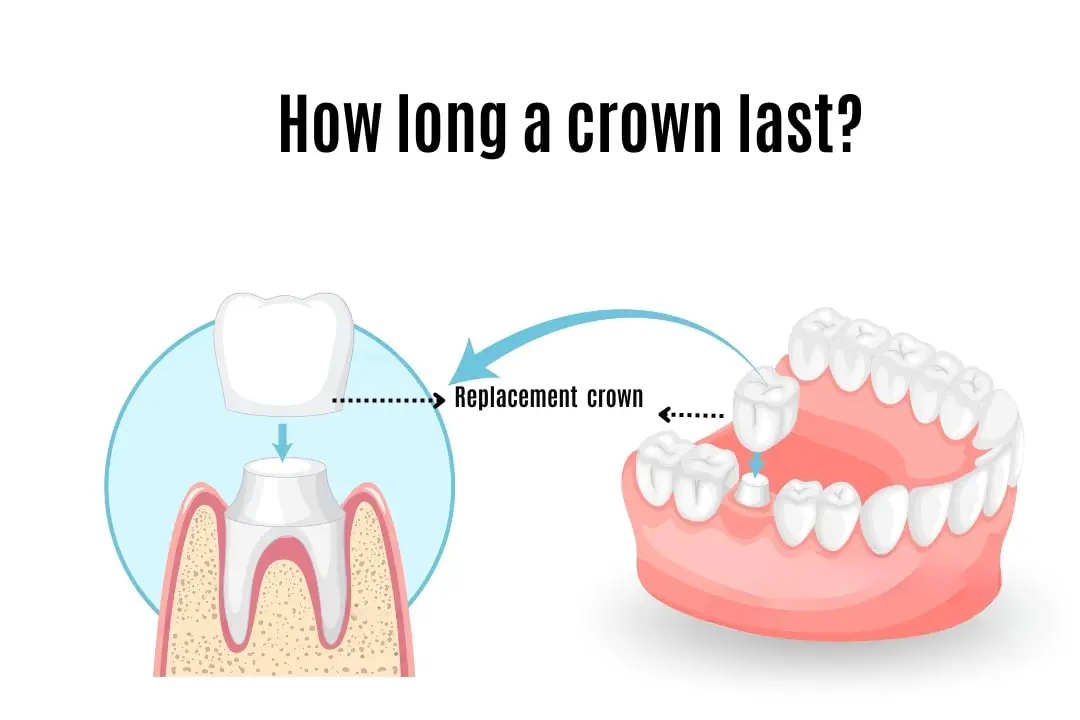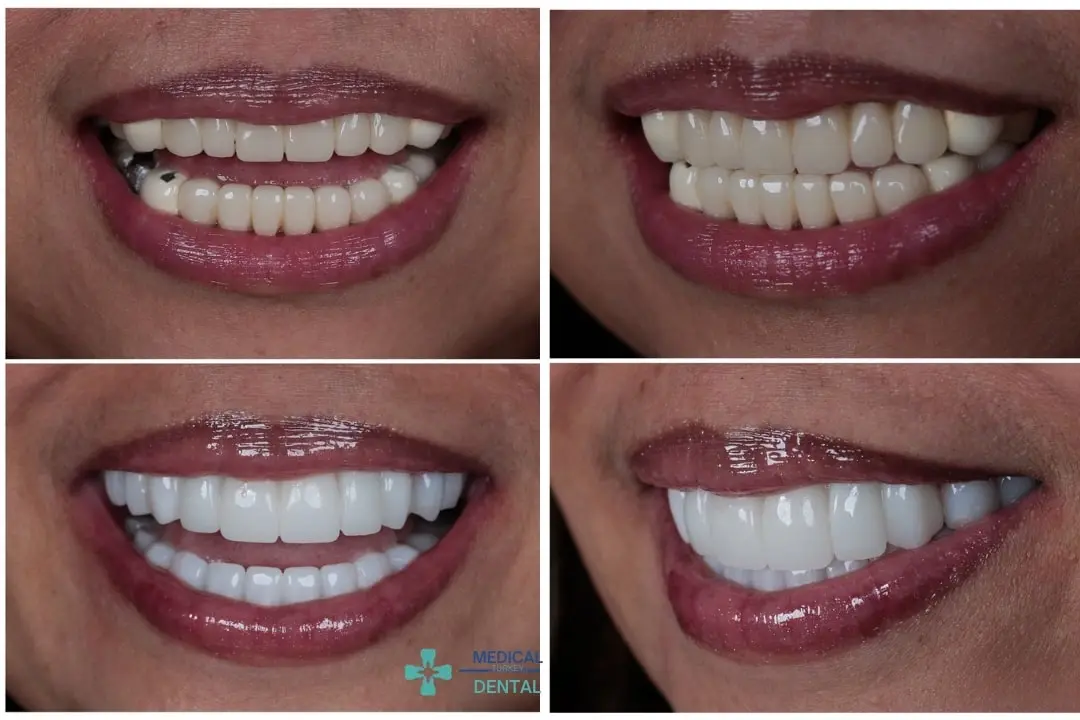How long do crowns last?
A typical porcelain dental crown lasts approximately 5 to 15 years or longer for most patients. Generally speaking, a dental crown can last approximately 10 years. This duration may vary depending on the patient's oral hygiene routine, lifestyle habits, and the chosen crown material. Simply put, the better your oral and dental health, the longer you can use your tooth crown.

In some cases, patients may never need to have their crowns replaced. However, an accident, injury, or trauma to the crown can cause cracks, breaks, or loosening of the crown.
If you would like more information about crown replacement, please contact our Medical Dental Turkey dental clinic in Antalya. Our dentists will be happy to guide you and help you achieve healthy teeth.
Which dental crowns last the longest?
The material used to make dental crowns plays a significant role in their longevity. For example, crowns made from metal tend to last longer than porcelain crowns due to the superior durability of the metal. However, porcelain crowns are often preferred by patients seeking a more natural appearance, as they blend seamlessly with the surrounding teeth.
For those who want the best of both worlds, metal-ceramic crowns, also known as PFM (Porcelain Fused to Metal), offer a balance between durability and aesthetics. These crowns are both durable and visually appealing, making them a popular choice for many patients.
How long do different types of tooth crowns last?
Tooth crowns can last for many years without any problems with proper care and the appropriate material selection. Generally, the average lifespan of a dental crown is around 10 years.
The type of crown is an important factor influencing your dentist's decision. Your dentist selects the most appropriate material, considering criteria such as the condition of your tooth and its durability. Factors such as the location of the selected tooth, the condition of the remaining tooth structure, and the visibility of the crown all influence the selection of the right material.
Let's briefly examine the lifespan of commonly preferred crowns.
How long do zirconium crowns last?
Zirconium crowns stand out with their strong structure and are among the most durable dental treatments. Made from zirconium dioxide, these crowns are extremely resistant to problems such as chipping and cracking. With adequate oral hygiene and regular maintenance, zirconium crowns can last for 10 to 20 years, and in some cases, even longer.

These crowns are also preferred for aesthetic reasons because they provide a natural appearance to teeth. Furthermore, zirconium crowns are lighter and more compatible with the tooth than metal-supported crowns. With their long-term durability and resistance to fractures, zirconium stands out as one of the strongest and most reliable dental veneering materials available today.
How long do porcelain-fused-to-metal crowns last?
The average lifespan of PFM crowns ranges from 10 to 15 years. This can be extended with regular dental care. Porcelain-fused-to-metal (PFM) crowns offer an ideal solution, especially for front teeth, thanks to their durability and natural appearance. The metal's reinforcement of porcelain makes them particularly suitable for patients who grind their teeth or have problems such as bruxism. However, if the gums recede over time, the edges of the metal may begin to show.
How long do composite resin crowns last?
Composite resin crowns offer an aesthetically pleasing appearance similar to natural teeth, but they may have a shorter lifespan than other crown types. Because they are more susceptible to cracking and breaking, their average lifespan is 5 to 10 years. However, their compatibility with materials like porcelain and their more affordable price make them attractive.
How long do porcelain crowns last?
Porcelain crowns, on the other hand, generally last between 5 and 15 years. If your tooth has not sustained any impact or injury, porcelain crowns can be used for a long time. These crowns are also a preferred option for aesthetic reasons, boasting a close resemblance to natural tooth color. With proper care, this lifespan can be extended even further.
How long do gold crowns last?
Gold crowns have long been recognised as a symbol of durability and reliability in dentistry. Gold fits perfectly onto the tooth and provides a long-lasting solution due to its high resistance to cracking and breaking. Research shows that gold crowns can be used without problems for 20 years or more when properly maintained.
However, gold's aesthetic difference from the natural tooth colour often leads to its preference for molars that are not visible when smiling. Today, dentists combine crowns with metals such as palladium, chromium, or nickel to increase durability and reduce cost. Gold crowns are a classic option that can be used safely for decades with proper care and hygiene.
What can affect the lifespan of a dental crown?
Dental crowns are an important part of your oral health, and how long they can be used without problems depends on a number of factors.
Poor oral hygiene
First and foremost, regular and proper oral hygiene is the key to extending the life of a crown. Daily tooth brushing, flossing, and professional cleaning every six months prevent bacteria from affecting the underlying tooth and keep the crown intact.
Type of dental crown
The durability of a crown varies depending on the material used; options such as porcelain, metal, or composite resin have different levels of strength and wear resistance.
The dentist's experience
At the same time, the dentist's preparation and measurement skills also play a critical role; digital scans or carefully taken measurements ensure that the crown fits the tooth perfectly, increasing its lifespan.
Beyond this, the current health of the tooth, gums, and bone structure also affects the crown's durability. Using teeth as tools, grinding teeth, or biting into hard foods can wear down or break the crown prematurely. In PFM (porcelain-fused-to-metal) crowns in particular, inadequate care and excessive use can lead to the metal base becoming visible and causing aesthetic loss.
If you notice loosening, decay, cracking, or aesthetic deterioration in your crown, these changes usually indicate that it is time to replace the crown. Regular check-ups and proper care are the most effective ways to maximise the lifespan of your crown.
FAQs
Do front crowns last longer than back teeth?
Yes, front tooth crowns are generally more durable than back teeth. This is because front teeth are exposed to less pressure and force. Since back teeth are used to chew and grind food, they are exposed to more wear and tear than crowns on back teeth.
How long do permanent crowns last?
Thanks to their durable construction, permanent crowns can last between 5 and 20 years without any problems. The lifespan of crowns can vary depending on the material used and your oral hygiene habits. It is possible to extend this period with regular dental care.
How long do temporary crowns last?
Temporary crowns provide a temporary solution while permanent crowns are being prepared and usually remain in the mouth for three weeks. Temporary crowns are not as durable as permanent crowns and are designed for shorter-term use.
How much do dental crowns cost in Turkey?
For dental crown prices in Turkey, please visit our special pricing page. Prices for dental crowns may vary depending on the material used and the treatment.
Are crowns more durable than dental veneers?
The fundamental differences between crowns and veneers affect the purpose and durability of each treatment option. A dental crown covers the entire tooth, while a veneer only covers the front part of the tooth. Crowns are generally more durable than veneers because they are thicker.
Generally, the lifespan of a dental veneer and a crown is similar, but veneers last for a shorter period of time because they are thinner. Veneers are usually preferred for aesthetic purposes, while crowns may be a more suitable option when a tooth is broken or cracked.
